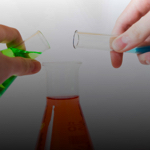Section 1
Preview this deck
Metals are held together by metallic bonds. This is why thy are
Front
Active users
0
All-time users
0
Favorites
0
Last updated
5 years ago
Date created
Mar 1, 2020
Cards (71)
Section 1
(50 cards)
Metals are held together by metallic bonds. This is why thy are
ductile and malleable
Intramolecular forces are found ______ a molecule
within
The model "sea of valence electrons" describes
metallic bond
What type of intramolecular force does KCL have?
ionic bonding
A solid compound that dissolves in water and conducts electricity is probably a/an
ionic compound
Water is weird in the sense that it is the only known substnace in the universe that expands on coling. The density of solid water (ice) is less than water. This is the reason ice floats on water. (true or false)
true
When water is boiled, the steam consists of individual hydrogen and oxygen atoms. This is because heating water breaks the intramolecular bonds between hydrogen and oxygen within a water molecule (true or false)
false
The ability for one molecule to attract to another is
adhesion
The property of water that makes it stick to the blade of grass is called
adhesion
List the properties of water
adhesion, cohesion, surface tension, hydrogen bonding, polar
Substances with higher intermolecular forces tend to be solids at room temperature (true or false)
true
H2O = H2 and O2 is an example of what?
breaking intramolecular forces
What is easier to break: intermolecular forces or intramolecular forces
intermolecular forces
As intermolecular forces increase, melting point
increases
As intermolecular forces increase, boiling point
increases
The ability for a molecule to attract to the same type of molecule is called:
cohesion
A solid compound that dissolves in water but does not conduct electricity is a
covalent compound
As intermolecular forces increase, viscosity
increases:
If electrons after being transferred between two atoms, it is likely to form a
ionic bond
The strongest type of bond
ionic
Stronger the IMF, (greater/smaller) is the surface tension
greater
The type of intermolecular force formed due to the attraction between the partially positive end of one polar molecule and the partilaly negative end of another moleculae could be _______ or _______
dipole dipole or hydrogen bonding
This type or attraction between two different molecules is called
Intermolecular forces
The positive ________ end of one water molecule is attracted to the _______ oxygen at the end of another molecule.
hydrogen, negative
Water and cooking oil will not mix because water is _____ and oil is _______. The "science" word for this is ______
polar, nonpolar, immiscible
As intermolecular forces increase, vapor pressure
increases:
an example:
raindrop
In case of water, the type of intermolecular force is called
hydrogen bonding
What is heat used for concerning water?
to break intermolecular forces
What type of intermolecular force does F2 have?
LDF
The reason why an insect is able to walk on water is because of the property of water called
surface tension
The REASON why atoms form chemical bonds is because
they are looking to finish an octet in their outer most energy shell and become stable
Chlorine atom bonding with chorine atom is an example of a/an
covalent bond
The reason why it takes longer for salt to melt vs. sugar is because
Ionic bonds are stonger than covalent bonds
The property of water that lets the tips of the tallest tree to get water is called
capillary action
What type of intramolecualr force does F2 have?
NPCB
What type of intramolecular force does Cu have?
metallic bonding
A chemical bond can be defined as
an attraction between two atoms that allows them to join together a kind of glue that holds atoms together so that they can form new compounds it's how atoms hook up - by transferring or sharing electrons - that helps them form new compounds
Stronger the IMF, (higher/lower) is the boiling point
higher
Solids to Liquids to Gasses is an example of what?
intermolecular forces breaking
Intermolecular forces are found ________ molecules
between
The reason why water is liquid at room temperature but hydrogen and oxygen gases are not is because the ______ in water are stronger
intermolecular forces
Fishes can live in partially frozen lakes. This is because the density of ice is _____ than water.
less
What do the dotted lines represent?
Intermolecular forces
Hydrogen bonding is only possible when hydrogen bonds with nitrogen, oxygen, or fluorine. (true or false)
true
A bond that is formed between metals and nonmetals is classified as
ionic bond
Temporary dipoles form as electrons move around in molecules. This causes an instantaneous and temporary attraction between molecules. this type of IMF is called _________
LDF
As intermolecular forces increase, surface tension
increases
An example of adhesion would be
wet hand (water sticks to hand)
The ability for plants to pull water up its roots is called
cappillary action
Section 2
(21 cards)


